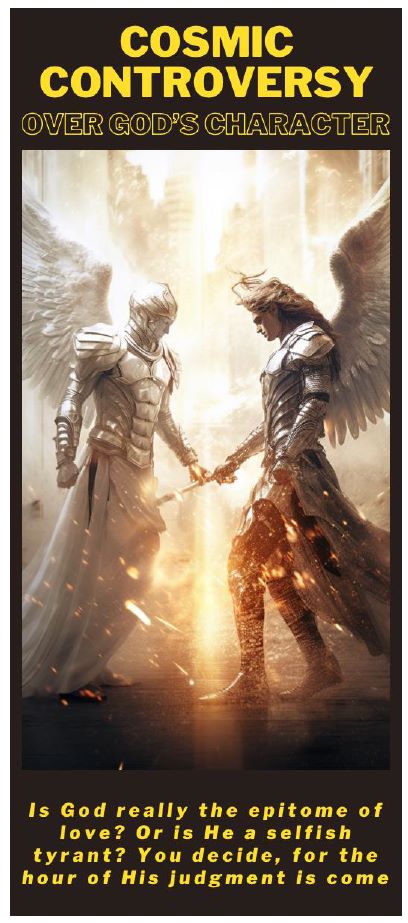(Numbers 16:28-34) Did God Kill Korah, Dathan, and Abiram?
“And Moses said: ‘By this you shall know that the Lord has sent me to do all these works, for I have not done them of my own will. If these men die naturally like all men, or if they are visited by the common fate of all men, then the Lord has not sent me. But if the Lord creates a new thing, and the earth opens its mouth and swallows them up with all that belongs to them, and they go down alive into the pit, then you will understand that these men have rejected the Lord.’ Now it came to pass, as he finished speaking all these words, that the ground split apart under them, and the earth opened its mouth and swallowed them up, with their households and all the men with Korah, with all their goods. So they and all those with them went down alive into the pit; the earth closed over them, and they perished from among the assembly. Then all Israel who were around them fled at their cry, for they said, ‘Lest the earth swallow us up also!’ (Numbers 16:28-34)
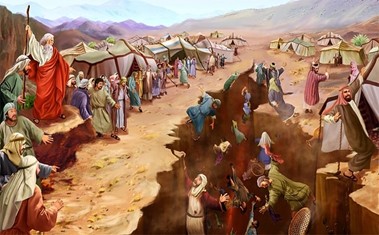 The story of Korah and his associates serves as a striking reminder of the price of rebellion. Psalm 88 was one of the Psalms written by the sons of Korah many years after the tragic incident and we can only imagine how painful were the words: “I am counted with those who go down to the pit” (Psalm 88:4). Again, although this author never participated in the rebellion of his forefather, he would have been regularly reminded that his family serves as a constant reminder of the wrath of God against the rebellious.
The story of Korah and his associates serves as a striking reminder of the price of rebellion. Psalm 88 was one of the Psalms written by the sons of Korah many years after the tragic incident and we can only imagine how painful were the words: “I am counted with those who go down to the pit” (Psalm 88:4). Again, although this author never participated in the rebellion of his forefather, he would have been regularly reminded that his family serves as a constant reminder of the wrath of God against the rebellious.
It must also have been a trying experience for the sons of Korah to have to live with an inheritance akin to Cain and Balaam:
“Woe to them! [rebels in the church] For they have gone in the way of Cain, have run greedily in the error of Balaam for profit, and perished in the rebellion of Korah.” (Jude 1:11)
Here Jude is obviously referring to past literal events in describing present spiritual events. There was no literal earthquake at the time of Jude which caused the ground to open up and swallow the rebels in the church during his day. Notice what Psalm chapter 7 says:
“See the one who is pregnant with wickedness, who conceives destructive plans, and gives birth to harmful lies – he digs a pit and then falls into the hole he has made. He becomes the victim of his own destructive plans and the violence he intended for others falls on his own head. I will thank the Lord for his justice; I will sing praises to the sovereign Lord!” (Psalm 7:14-17; New English Translation)
The psalmist says the wicked (or rebels) dig their own pit and fall into the pit they themselves have made. The author continues and says this is God’s justice. He doesn’t say God’s justice is the act of directly throwing rebels alive into a pit, but that His justice is executed by not preventing the rebels to fall into the pit they have dug. He allows the violence they intended for others to come down upon their own heads.
Could this be what really happened to Korah and his associates? Could their constant murmurings against Moses, Aaron and God resulted in digging their own pit and thus their own violent behavior came crashing down upon themselves? Now, I’m not saying that Korah and his associates literally started digging a pit with shovels and jumped into it. But is it possible that their rebellion had a direct cause for the earth literally opening up and swallowing them? Or are we to believe that a God of perfect love caused the whole incident to happen as a result of vengeful wrath and retributive justice against those who hate Him?
The Bible Says God did It, Therefore I Believe It
There is absolutely nothing wrong with taking the Bible literally. In fact, that’s the way we are to read and study it. The problem isn’t with what the Bible literally says, it’s that people aren’t looking at the whole Bible to get the big picture of what the Bible says. Let’s look at a few examples:
Example #1 – The Death of King Saul
“So Saul died for his unfaithfulness which he had committed against the Lord, because he did not keep the word of the Lord, and also because he consulted a medium for guidance. But he did not inquire of the Lord; therefore He [God] killed him, and turned the kingdom over to David the son of Jesse.” (1 Chronicles 10:13, 14)
Here we read a plain statement right from the Bible — "therefore He [God] killed him." The books of 1st and 2nd Chronicles are believed to be written by Ezra. Ezra says God killed Saul while in battle. But did God literally come down and kill Saul with a sword or a bolt of lightning or simply cause his heart to stop? No. In verses 3 and 4 Ezra tells us exactly what happened:
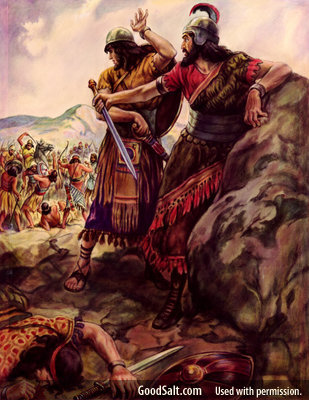 “The battle became fierce against Saul. The archers hit him, and he was wounded by the archers. Then Saul said to his armorbearer, ‘Draw your sword, and thrust me through with it, lest these uncircumcised men come and abuse me.’ But his armorbearer would not, for he was greatly afraid. Therefore Saul took a sword and fell on it.” (1 Chronicles 10:3, 4)
“The battle became fierce against Saul. The archers hit him, and he was wounded by the archers. Then Saul said to his armorbearer, ‘Draw your sword, and thrust me through with it, lest these uncircumcised men come and abuse me.’ But his armorbearer would not, for he was greatly afraid. Therefore Saul took a sword and fell on it.” (1 Chronicles 10:3, 4)
Saul literally died by committing suicide. But Ezra also says that God killed him. Could it be that when Ezra says God killed Saul he was simply using a Hebrew idiom where God is said to do something which He only reluctantly permits to be done? Can you see that the statement “I take the Bible just as it reads” must include all the Bible and not just what one verse says?
It is extremely important that we realize that Ezra wrote the book of Chronicles. In Nehemiah chapter 8 we read that Ezra began to read the Book of the Law (the first five books of the Bible) before the people, while he and his companion priests “helped the people to understand the Law” and “they read distinctly from the book, in the Law of God; and they gave the sense, and helped them to understand the reading” (verses 7 and 8). So, although it is important to simply read the Bible, we must know how to read it in order for us to understand it fully. Jesus taught us the same principle:
“And behold, a lawyer stood up to put Him [Jesus] to the test, saying, ‘Teacher, what shall I do to inherit eternal life?” He [Jesus] said to him, ‘What is written in the Law? How do you read it?’” (Luke 10:25, 26)
Take a look at how the prophet Hosea links God’s anger and wrath with Israel destroying themselves:
“O Israel, thou hast destroyed thyself; but in Me [God] is thine help. I will be thy King: where is any other that may save thee in all thy cities? and thy judges of whom thou saidst, Give me a king and princes? I gave thee a king in Mine anger, and took him away in My wrath.” (Hosea 13:9-11; King James Version)
God’s anger was exercised by giving Israel exactly what they wanted – an earthly king. Israel destroyed themselves in this decision by cutting themselves off from God and thus God’s wrath was exercised by reluctantly permitting all this to happen although it is worded as God directly killing King Saul – “I … took him away in My wrath.”
Could it be that God “killed” or “took away” Korah and his associates in the sense of not preventing them from committing spiritual suicide by choosing Satan as their master? After all, God has said, “But he who sins against Me wrongs his own soul; All those who hate Me love death” (Proverbs 8:36). And referring to Korah and his associates, God says they “sinned against their own souls” (Numbers 16:38).
Example #2 – The Story of Job
“While he [Job] was still speaking, another also came and said, ‘The fire of God fell from heaven and burned up the sheep and the servants, and consumed them; and I alone have escaped to tell you!’” (Job 1:16)
 Again, another plain statement saying that God reigned down fire to consume the sheep and the servants of Job. However, we learn who really caused this fire back in verse 12:
Again, another plain statement saying that God reigned down fire to consume the sheep and the servants of Job. However, we learn who really caused this fire back in verse 12:
“And the Lord said to Satan, ‘Behold, all that he [Job] has is in your power; only do not lay a hand on his person.’ So Satan went out from the presence of the Lord.” (Job 1:12)
Here is another example of the Bible saying it was God who directly consumed things with fire, while it was literally Satan who did it. The messenger who told Job this did not know what was going on behind the scenes as we do by reading the book of Job today. In his perception, God was the one reigning down the fire.
Just before the death of Korah and his associates, we read this:
“And Moses said to Korah, ‘Tomorrow, you and all your company be present before the Lord—you and they, as well as Aaron. Let each take his censer and put incense in it, and each of you bring his censer before the Lord, two hundred and fifty censers; both you and Aaron, each with his censer.’ So every man took his censer, put fire in it, laid incense on it, and stood at the door of the tabernacle of meeting with Moses and Aaron.” (Numbers 16:16-18)
Right after the death of Korah we read this:
“And a fire came out from the Lord and consumed the two hundred and fifty men who were offering incense.” (Numbers 16:35)
Is it possible to look behind the scenes as in the case of Job and conclude that this fire literally came from the master they had chosen – Satan – even though it reads (according to the author’s perception) that God did it? Pay careful attention to what God told the prophet Elijah:
“Then He [God] said [to Elijah], ‘Go out, and stand on the mountain before the Lord.’ And behold, the Lord passed by, and a great and strong wind tore into the mountains and broke the rocks in pieces before the Lord, but the Lord was not in the wind; and after the wind an earthquake, but the Lord was not in the earthquake; and after the earthquake a fire, but the Lord was not in the fire; and after the fire a still small voice.” (1 Kings 19:11, 12)
“acts of God.” However, God Himself tells us that He is not in these elements of destruction. With this in mind, isn’t it reasonable to conclude that God was not in the earthquake which caused the ground to split under Korah and his associates and not in the fire that consumed the 250 men?
Was Satan behind this tragic event after all? Our final example will not only help us understand what happened but will tell us exactly who killed Korah and his associates.
Example #3 – David Numbering the People
“Again the anger of the Lord was aroused against Israel, and He moved David against them to say, ‘Go, number Israel and Judah.’” (2 Samuel 24:1)
Here is yet another plain and literal statement. God was angry, so He moved David to number the people. But we can’t stop there. Why? Because notice what happens in verse 10:
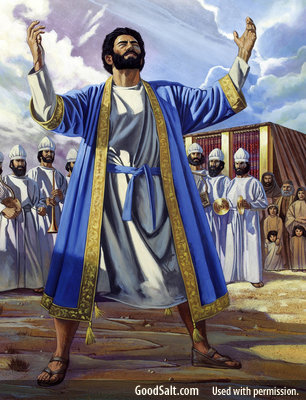 “And David’s heart condemned him after he had numbered the people. So David said to the Lord, ‘I have sinned greatly in what I have done; but now, I pray, O Lord, take away the iniquity of Your servant, for I have done very foolishly.’”
“And David’s heart condemned him after he had numbered the people. So David said to the Lord, ‘I have sinned greatly in what I have done; but now, I pray, O Lord, take away the iniquity of Your servant, for I have done very foolishly.’”
Wait a minute! Why was David feeling guilty saying he had sinned when it was God who moved him to number the people? Wasn’t he doing what God wanted him to do? That plain and literal statement in verse 1 has just become confusing and apparently contradictive. It’s not so plain anymore. To add to this, we can read what Ezra wrote concerning this exact same incident and see that Ezra turns it completely upside down:
“Now Satan stood up against Israel, and moved David to number Israel.” (1 Chronicles 21:1)
What?!? Ezra tells us that it was Satan who moved David to number the people. No wonder David felt guilty and referred to his actions as sin. Both of these statements are to be taken literally; for they are both correct and do not contradict each other. Ezra is simply giving us insight and understanding to how the anger of God works. David already had submitted to the enticement of Satan, and in His anger, God permitted Satan to take full control of David. Afterwards, David repented of his sin knowing that he had bowed to the authority of Satan who wanted to claim his life. Because God never interferes with our free choice, God’s anger was executed by reluctantly and tearfully giving David over to his wrong choices.
lashes out to cause anyone harm
John tells us that “God is love” (1 John 4:8). Paul tells us that “Love does no harm to a neighbor” (Romans 13:10), or as the Weymouth translation says, “Love avoids doing any wrong to one’s fellow man.” This is important to know as we study the death of Korah and his associates because Jesus tells us that God is always “kind to the unthankful and evil” (Luke 6:35). Could it be that when Korah and his associates went down into the pit, God was simply giving them over to the master-murderer they had chosen – Satan? (John 8:44).
Complaints in the Camp
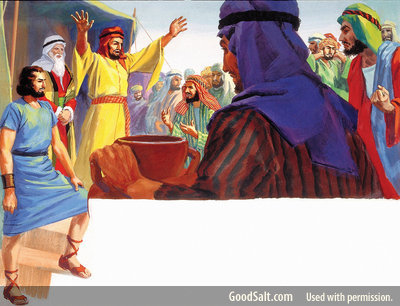 The background to the story of Korah is that he and his two main associates Dathan and Abiram, began to consistently “complain” or “murmur” about Moses and Aaron saying, “You take too much upon yourselves, for all the congregation is holy, every one of them, and the Lord is among them. Why then do you exalt yourselves above the assembly of the Lord?” (Numbers 16:3). They accuses Moses and Aaron of lifting themselves up higher and holier than everyone else. Korah’s argument was, since his family (the Korahites) have also been chosen of the Lord to serve in the Tabernacle, then they should be lifted up as equally holy.
The background to the story of Korah is that he and his two main associates Dathan and Abiram, began to consistently “complain” or “murmur” about Moses and Aaron saying, “You take too much upon yourselves, for all the congregation is holy, every one of them, and the Lord is among them. Why then do you exalt yourselves above the assembly of the Lord?” (Numbers 16:3). They accuses Moses and Aaron of lifting themselves up higher and holier than everyone else. Korah’s argument was, since his family (the Korahites) have also been chosen of the Lord to serve in the Tabernacle, then they should be lifted up as equally holy.
God had already called the people out for their constant complaining multiple times:
“And the Lord spoke to Moses and Aaron, saying, ‘How long shall I bear with this evil congregation who complain against Me? I have heard the complaints which the children of Israel make against Me. Say to them, ‘As I live,’ says the Lord, ‘just as you have spoken in My hearing, so I will do to you: The carcasses of you who have complained against Me shall fall in this wilderness, all of you who were numbered, according to your entire number, from twenty years old and above. Except for Caleb the son of Jephunneh and Joshua the son of Nun, you shall by no means enter the land which I swore I would make you dwell in.” (Numbers 14:26-30)
Keep in mind that the words, “just as you have spoken in My hearing, so I will do to you” mean that God would give them over to their complaining. He’s not saying He’s going to cause them any harm. They had continually charged Moses and God for leading them into the wilderness to kill them (Exodus 14:11,12; Numbers 21:5). Since their minds were fixed on the belief they were going to die in the wilderness instead of having faith in God their Leader, God gave them over to their own thoughts and they perished in the wilderness. Thus, the book of Proverbs states: “For as he thinks in his heart, so is he” (Proverbs 23:7). And Job says it this way: “For the thing I greatly feared has come upon me, And what I dreaded has happened to me” (Job 3:25).
“One might read Dathan and Abiram as the last representatives of the spies, who believed that Egypt and even the Wilderness were better than the true ‘Land flowing with milk and honey’. In their torpor of anxiety, the spies spread calumnies [false statements] about the land, claiming that it was ‘a land that consumes its inhabitants’ (Numbers 13:32). While the spies, whom Dathan and Abiram join ideologically, feared the Land of Israel devoured its inhabitants, they themselves are devoured by the desert … No bodies to mourn. No testimonial to natural death. No grave to mark their passing. The face of the earth returns, seamlessly, to its mute state as if never rent asunder. Unlike other sinkholes in the earth, this ‘mouth of the earth’ swallowed the combatants and closed up again, leaving no trace.” (When the Earth Opened her Mouth, by Rav Rachel Adelman [PhD, the Hebrew University of Jerusalem], Associate Professor of Hebrew Bible at Hebrew College, July 02, 2019)
To settle things peacefully, Moses decides to speak with Dathan and Abiram. Let’s read their reaction to Moses’ request:
“And Moses sent to call Dathan and Abiram the sons of Eliab, but they said, ‘We will not come up! Is it a small thing that you have brought us up out of a land flowing with milk and honey, to kill us in the wilderness, that you should keep acting like a prince over us? Moreover you have not brought us into a land flowing with milk and honey, nor given us inheritance of fields and vineyards. Will you put out the eyes of these men? We will not come up!’” (Numbers 16:12-14)
 Through jealousy and a refusal to accept the leadership of Moses, Korah, Dathan and Abiram blamed Moses and Aaron for mismanaging everything. They declared that they were holy and wanted to be lifted up, hence they would not “go up” to meet Moses whom they believed was exalting himself above everyone else. These men were instruments of Satan, and they accused the patient and selfless Moses with completely selfish motives. This deeply wounded his heart who had sacrificed everything for the cause of God. Notice how it’s worded here:
Through jealousy and a refusal to accept the leadership of Moses, Korah, Dathan and Abiram blamed Moses and Aaron for mismanaging everything. They declared that they were holy and wanted to be lifted up, hence they would not “go up” to meet Moses whom they believed was exalting himself above everyone else. These men were instruments of Satan, and they accused the patient and selfless Moses with completely selfish motives. This deeply wounded his heart who had sacrificed everything for the cause of God. Notice how it’s worded here:
“Then Moses was very angry, and said to the Lord, ‘Do not respect their offering. I have not taken one donkey from them, nor have I hurt one of them.’” (Numbers 16:15)
The text says that Moses was “angry” but the Hebrew word חָרָה (charah) can also be translated as “grieved.” Notice Samuel’s reaction to Saul using the same Hebrew word:
“ ‘I greatly regret that I have set up Saul as king, for he has turned back from following Me, and has not performed My commandments.’ And it grieved [charah] Samuel, and he cried out to the Lord all night.” (1 Samuel 15:11)
Another way of writing it would be that Moses was “grieved” or “moved” at Korah’s unjust accusations. Let us note carefully what happens next:
“And the Lord spoke to Moses and Aaron, saying, ‘Separate yourselves from among this congregation, that I may consume them in a moment.’” (Numbers 16:20, 21)
This is a very similar statement to what God said in regard to the sin of the Golden Calf:
“Now therefore, let Me alone, that My wrath may burn hot against them and I may consume them. And I will make of you [Moses] a great nation.” (Exodus 32:10)
In these statements some see a tyrannical God who gets so furious and violent when things don’t go His way. But for those of us who know the true character of God, we see God testing Moses to bring him to Christian maturity. The reason for this seemingly harsh judgment was to cause sin to abound. Notice how Paul explains this concept:
“Moreover the Law entered that the offense might abound. But where sin abounded, grace abounded much more, so that as sin reigned in death, even so grace might reign through righteousness to eternal life through Jesus Christ our Lord.” (Romans 5:20, 21)
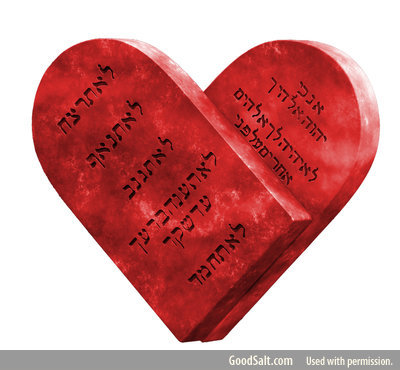 Paul is speaking about when the Law enters privately into one’s heart. This will cause the inner sinfulness to abound (or be exposed). God doesn’t do this to condemn the sinner, but so that His grace can much more abound as the sinner accepts God’s free forgiveness and submits to God’s grace to work in and through them to overcome the sin that is being exposed.
Paul is speaking about when the Law enters privately into one’s heart. This will cause the inner sinfulness to abound (or be exposed). God doesn’t do this to condemn the sinner, but so that His grace can much more abound as the sinner accepts God’s free forgiveness and submits to God’s grace to work in and through them to overcome the sin that is being exposed.
“What shall we say then? Is the Law sin? Certainly not! On the contrary, I would not have known sin except through the Law. For I would not have known covetousness unless the Law had said, ‘You shall not covet.’ … Therefore the Law is holy, and the commandment holy and just and good.” (Romans 7:7, 12)
Israel had deeply wounded Moses and at this moment the Spirit of Christ in Moses responded to the test. Through God’s statement to consume the congregation, the Law was entering Moses to cause any inner sin to abound. God greatly desired for Moses, as a great leader, to enter the promised land but to do so, God had to prepare him. God needed to draw out any lingering anger and coercion tactics from Moses that he adopted from growing up in Egypt. Moses may have evil thoughts of killing Korah (as he did the Egyptian in Exodus 2:11,12) which the Law was drawing out. Yet on this point, instead of submitting to what he might want to do (kill Korah), Moses chose to die to self in Christ and grace did much more abound in him and Aaron in the following way:
“Then they fell on their faces, and said, ‘O God, the God of the spirits of all flesh, shall one man sin, and You be angry with all the congregation?’” (Numbers 16:22)
In this test for Moses was the principle of the Cross. Jesus tells us of this principle:
“But I say to you who hear: Love your enemies, do good to those who hate you, bless those who curse you, and pray for those who spitefully use you … if you love those who love you, what credit is that to you? For even sinners love those who love them. And if you do good to those who do good to you, what credit is that to you? For even sinners do the same … But love your enemies, do good, and lend, hoping for nothing in return; and your reward will be great, and you will be sons of the Most High. For He is kind to the unthankful and evil. Therefore be merciful, just as your Father also is merciful.” (Luke 6:27-36)
In passing the test, Moses chose to allow His flesh to be crucified with Christ (Luke 9:23; Galatians 2:20). How precious is the Spirit of Christ in human hearts! We see Christ interceding in Moses and Aaron to the Father and this is just as the Father desired it; for He is not willing that any should perish but that all should come to repentance (2 Peter 3:9). The judgment of God to consume the congregation drew out of Moses and Aaron the spirit of intercession to save the people. The Father said this through the language of the Old Covenant in order to draw from Moses and Aaron the intercession according to the New Covenant that would give Israel more time to repent.
When Moses was entreating Israel to flee from the coming destruction, the divine judgment might even then have been stayed, if Korah and his associates had repented and sought forgiveness. At first, Korah’s three sons, Assir, Elkanah and Abiasaph (Exodus 6:24) joined in their father’s quarrel. However, soon after, they regretted their actions and repented. As a result, they were spared their father’s fate and survived (Numbers 26:11). As noted earlier, their descendants wrote several Psalms we have today (Psalms 42, 44-49, 84-85, and 87-88).
“Perhaps the most telling point about these saved sons of Korah is the way the LORD graciously used them in His service in years to come. The prophet Samuel was a descendant of Korah (1 Chronicles 6:31-38). The Korahites were assigned the task of custodian and doorkeeper for the Tabernacle (1 Chronicles 9:19-21). Among King David’s military men were a group of Korahites commended for their expertise. (1 Chronicles 12:1-6).” (Melissa McLaughlin, Who were the Sons of Korah in the Bible? October 22, 2020, Christian author/teacher, melissamcLaughlin.org)
If only Korah and his companions followed their example, they too would have been spared. But their stubborn persistence sealed their doom. They had chosen another master and God would reluctantly honor their request.
The Master Whom They Had Chosen is “the Destroyer”
How do we know that they were destroyed by “the Destroyer” and not directly by God? In his first letter to the Corinthian believers, Paul not only refers to all the complaining that the Israelites did during their wilderness journey from Egypt to the promised land, but he tells us exactly who killed them:
 “Nor let us tempt Christ, as some of them also tempted, and were destroyed by serpents [Numbers 21]; nor complain, as some of them also complained [Numbers 11 and 16], and were destroyed by the Destroyer” (1 Corinthians 10:10)
“Nor let us tempt Christ, as some of them also tempted, and were destroyed by serpents [Numbers 21]; nor complain, as some of them also complained [Numbers 11 and 16], and were destroyed by the Destroyer” (1 Corinthians 10:10)
Paul says that everyone who was destroyed due to their complaining was destroyed by “the Destroyer.” This included Korah and his associates.
Who is this Destroyer? The Greek word for “destroyer” here is ὀλοθρευτής (olothreutés) which also carries the meaning of “venomous serpent.” Who is this venomous Serpent?
“So the great dragon was cast out, that serpent of old, called the Devil and Satan, who deceives the whole world; he was cast to the earth, and his angels were cast out with him.” (Revelation 12:9)
In Revelation 9:11 we read:
“Their king is the angel from the bottomless pit; his name in Hebrew is Abaddon, and in Greek, Apollyon—the Destroyer.” (New Living Translation)
Satan (the Devil) himself is the enemy who tempts man to sin, and then destroys him if he can:
“Be sober, be vigilant; because your adversary the Devil walks about like a roaring lion, seeking whom he may devour.” (1 Peter 5:8)
By allowing Scripture to explain itself, we see that it was Satan, the Destroyer, who literally killed Korah and his associates. Korah, Dathan and Abiram had made themselves agents of Satan, fully under his control. Being filled with the spirit of Satan, they desired to exalt themselves and usurp the leadership of Moses. They refused to repent. The Spirit of Christ tried to save them, but they refused to listen. When they transgressed God’s commandments, then they separated themselves from Him, and they were left to feel the power of the Destroyer.
"We find Paul re-reading the Old Testament in the light of Christ along these lines. In 1 Cor. 10:5 [actually verse 10] he refers to the ‘grumblers’ who were slain by the ‘the destroying angel’ in the OT — referring to the judgment of Korah and his followers when the earth opened up and some rebels fell into it and when fire came down from the sky and incinerated others. If you read the OT account of this judgment, however, there’s no mention of a destroyer. It simply looks like Yahweh did it. And I don’t doubt that the author of the OT narrative believed Yahweh did this. But in the light of Christ, Paul had more insight into how God judges than people in the OT had. With a grieving heart he allows evil to run its course, but he does not kill." (Greg Boyd, reknew.org, October 9, 2012, words in brackets added)
Our Sins Effect the Earth
Scripture tells us that man’s sinfulness has an indirect effect upon the earth. The earth from which we were created mirrors back our sinfulness.
“And to the man He [God] said, ‘Since you listened to your wife and ate from the tree whose fruit I commanded you not to eat, the ground is cursed because of you. All your life you will struggle to scratch a living from it. It will grow thorns and thistles for you, though you will eat of its grains. By the sweat of your brow will you have food to eat until you return to the ground from which you were made. For you were made from dust, and to dust you will return.’” (Genesis 3:17-19; New Living Translation)
 The prophet Isaiah tells us more about this curse:
The prophet Isaiah tells us more about this curse:
“The earth mourns and fades away, The world languishes and fades away; The haughty people of the earth languish. The earth is also defiled under its inhabitants, Because they have transgressed the Laws, Changed the ordinance, Broken the everlasting covenant. Therefore the curse has devoured the earth, And those who dwell in it are desolate. Therefore the inhabitants of the earth are burned, And few men are left.” (Isaiah 24:4-6)
Paul tells us the same:
“For we know that the whole creation groans and labors with birth pangs together until now.” (Romans 8:22)
In Leviticus chapter 18, God tells us that because “the land is defiled” due to its corrupt inhabitants “the land vomits out its inhabitants” (Leviticus 18:25). God then warns:
 “You shall therefore keep My statutes and My judgments, and shall not commit any of these abominations, either any of your own nation or any stranger who dwells among you (for all these abominations the men of the land have done, who were before you, and thus the land is defiled), lest the land vomit you out also when you defile it, as it vomited out the nations that were before you.” (Leviticus 18:26-28)
“You shall therefore keep My statutes and My judgments, and shall not commit any of these abominations, either any of your own nation or any stranger who dwells among you (for all these abominations the men of the land have done, who were before you, and thus the land is defiled), lest the land vomit you out also when you defile it, as it vomited out the nations that were before you.” (Leviticus 18:26-28)
Moses writes “the earth opened its mouth and swallowed them up” (Numbers 16:32). This echoes what God spoke to Cain after he killed his brother Abel:
“And He [God] said, ‘What have you done? The voice of your brother’s blood cries out to Me from the ground. So now you are cursed from the earth, which has opened its mouth to receive your brother’s blood from your hand. When you till the ground, it shall no longer yield its strength to you. A fugitive and a vagabond you shall be on the earth.’” (Genesis 4:10, 11)
In Genesis chapter 6 we read that because “the wickedness of man was great in the earth, and that every imagination of the thoughts of his heart was only evil continually … The earth also was corrupt before God, and the earth was filled with violence” (Genesis 6:5, 11). Notice that, because of the corruption of man, the earth itself is also corrupt and full of violence. Sin had affected all man, beast, air, and land (Romans 8:22).
 Is it not reasonable to conclude that as the earth becomes defiled by swallowing the casualties of human tragedy and violence, it becomes so sick that it vomits out its inhabitants, perhaps even flooding and drowning them? (Please see the article entitled: Did God Really Drown Millions of People in the Flood?). Whether it’s swallowing or vomiting, the land is doing nothing more than absorbing and reflecting man’s sinfulness and violence back onto them.
Is it not reasonable to conclude that as the earth becomes defiled by swallowing the casualties of human tragedy and violence, it becomes so sick that it vomits out its inhabitants, perhaps even flooding and drowning them? (Please see the article entitled: Did God Really Drown Millions of People in the Flood?). Whether it’s swallowing or vomiting, the land is doing nothing more than absorbing and reflecting man’s sinfulness and violence back onto them.
The book of Hebrews tells us that Christ is “upholding all things by the word of His power” (Hebrews 1:3). Even the seas don’t move out of their place by the power of God’s word “when He marked out the foundations of the earth” (Proverbs 8:28, 29). Everything stays in place as long as Christ, His Father, and the angels are holding things together. The book of Revelation describes the scene:
“After these things I saw four angels standing at the four corners of the earth, holding the four winds of the earth, that the wind should not blow on the earth, on the sea, or on any tree. Then I saw another angel ascending from the east, having the seal of the living God. And he cried with a loud voice to the four angels to whom it was granted to harm the earth and the sea, saying, ‘Do not harm the earth, the sea, or the trees till we have sealed the servants of our God on their foreheads.’” (Revelation 7:1-3)
God’s angels are holding back Satan’s “winds of strife” (war, corruption, death, destruction etc.) that wish to devastate this planet and all those upon it. It is not until God’s people are sealed and everyone has chosen whom they will serve when the angels will at last let go.
The author of the book of Hebrews teaches that every time we sin we “crucify Christ afresh” (Hebrews 6:6). When Korah and his associates persistently sinned, without any remorse, they crucified Christ forcing Him to let go and Satan to take control. As a result, the defiled earth mirrored its defiled inhabitants who kept opening their mouths in constant complaints by opening its mouth and swallowing them alive, thus answering the eternal precept that we reap what we sow.
“He digs a pit and then falls into the hole he has made. He becomes the victim of his own destructive plans and the violence he intended for others falls on his own head.” (Psalm 7:15, 16)
“Because they sow the wind, they will reap a hurricane.” (Hosea 8:7)
“Do not be deceived, God is not mocked; for whatever a man sows, that he will also reap. For he who sows to his flesh will of the flesh reap corruption, but he who sows to the Spirit will of the Spirit reap everlasting life.” (Galatians 6:7, 8)
The “If” Questions
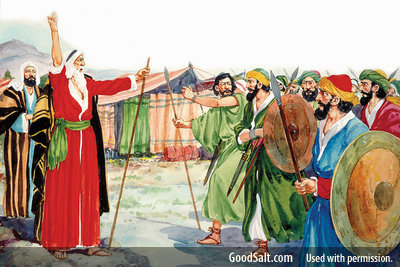 “And Moses said: ‘By this you shall know that the Lord has sent me to do all these works, for I have not done them of my own will. If these men die naturally like all men, or if they are visited by the common fate of all men, then the Lord has not sent me. But if the Lord creates a new thing, and the earth opens its mouth and swallows them up with all that belongs to them, and they go down alive into the pit, then you will understand that these men have rejected the Lord.’” (Numbers 16:28-30)
“And Moses said: ‘By this you shall know that the Lord has sent me to do all these works, for I have not done them of my own will. If these men die naturally like all men, or if they are visited by the common fate of all men, then the Lord has not sent me. But if the Lord creates a new thing, and the earth opens its mouth and swallows them up with all that belongs to them, and they go down alive into the pit, then you will understand that these men have rejected the Lord.’” (Numbers 16:28-30)
At first glance these words seem to very clearly teach that it was indeed a direct decree from God that brought about this destruction. The answer lies in the little word if. The people had seen plenty of evidence that the Lord was leading Moses through all that happened in Egypt and the Red Sea and in Mt Sinai. There was abundant evidence that Moses was sent by the Lord. A miracle performed in the context that Moses framed it, is a miracle that responds to doubt. When Jesus was questioned by Satan about His position as the Son of God, He refused to work a miracle in response to the temptation connected to “if You are….”:
“Now when the tempter came to Him [Jesus], he said, ‘If You are the Son of God, command that these stones become bread.’ But He answered and said, ‘It is written, ‘Man shall not live by bread alone, but by every word that proceeds from the mouth of God.’” (Matthew 4:3, 4)
When if questions are connected to defending a person’s identity or ministry by working miracles then we know it is a temptation of Satan. Elijah faced a similar temptation to Moses and Jesus in his ministry. He was sent to warn the king of his wrong actions. The king wanted to capture him, giving evidence that he did not believe Elijah:
“And Elijah answered and said to the captain of fifty, If I be a man of God, then let fire come down from heaven, and consume thee and thy fifty. And there came down fire from heaven, and consumed him and his fifty.” (2 Kings 1:10)
On Mt Carmel it was proved clearly that Elijah was a man of God. With so many people against him, Elijah was tempted at times to doubt his calling.
 “And there he went into a cave, and spent the night in that place; and behold, the word of the Lord came to him, and He said to him, ‘What are you doing here, Elijah?’ So he said, ‘I have been very zealous for the Lord God of hosts; for the children of Israel have forsaken Your covenant, torn down Your altars, and killed Your prophets with the sword. I alone am left; and they seek to take my life.’” (1 Kings 19:9, 10)
“And there he went into a cave, and spent the night in that place; and behold, the word of the Lord came to him, and He said to him, ‘What are you doing here, Elijah?’ So he said, ‘I have been very zealous for the Lord God of hosts; for the children of Israel have forsaken Your covenant, torn down Your altars, and killed Your prophets with the sword. I alone am left; and they seek to take my life.’” (1 Kings 19:9, 10)
Satan tempted Elijah to doubt his calling, and this is revealed in the word if. This little word betrays the temptation of Satan. The miracle of fire from heaven called for was mingled with Elijah’s struggle with his own identity as a man of God or not. Why would he struggle? He knew he had failed when he ran from Jezebel. He was tempted to seek a miracle to prove his identity. We know that this was not the right spirit for Jesus tells us this:
“Now it came to pass, when the time had come for Him to be received up, that He steadfastly set His face to go to Jerusalem, and sent messengers before His face. And as they went, they entered a village of the Samaritans, to prepare for Him. But they did not receive Him, because His face was set for the journey to Jerusalem. And when His disciples James and John saw this, they said, ‘Lord, do You want us to command fire to come down from heaven and consume them, just as Elijah did?’ But He turned and rebuked them, and said, ‘You do not know what manner of spirit you are of. For the Son of Man did not come to destroy men’s lives but to save them.’ And they went to another village.” (Luke 9:54-56)1
A few verses early Jesus had said, “If anyone desires to come after Me, let him deny himself, and take up his cross daily, and follow Me” (Luke 9:23). And Paul says that, as one does this, their “old man” (their old ego/selfishness) is “crucified with Christ” in order to live righteously by the perfect unfailing faith of Jesus (Galatians 2:20).
Through the suffering of carrying his own cross, and his fleshly desires being crucified with Christ, Moses had been deeply wounded by the false accusations of Korah, Dathan and Abiram (cf. Isaiah 53:5). He saw nearly the whole congregation turn against him. Like Jesus, after all he had done, they all forsook him and fled (cf. Mark 14:50). While Moses was suffering in his flesh, Satan called him to come down from this Cross (cf. Mark 15:29-32). Like Elijah, he was tempted to call for a miracle to sustain his position.
After Elijah’s victory over the prophets of Baal upon Mt Carmel (1 Kings 18:38, 39) he moved ahead of the Lord and personally slaughtered the prophets of Baal with a sword (verse 40). Instead of waiting for the Lord to give clear direction, he took responsibilities upon himself that were not given to him. He later regretted his decision “and he prayed that he might die, and said, ‘It is enough! Now, Lord, take my life, for I am no better than my fathers!’” (1 Kings 19:4). Please see the article entitled: Didn’t God Send Fire Down From Heaven and Consume the Soldiers at the Command of Elijah? For further details.
Never once did He appeal for a miracle to prove His own identity.
He trusted in what His Father had told Him (Matthew 4:4)
In a similar manner, when the Lord told Moses to tell the people to stand back from Korah, Dathan and Abiram, did Moses assume responsibilities that were not given to him when he expressed the “if” questions as did Elijah by calling down fire from heaven to deal with those men who were set to capture him (2 Kings 1:9-13)? Keep in mind, we know that Jesus tells us this was not the Spirit of God that was in this fire (Luke 9:54-56). We also know that God had told Elijah that He is not in the fire through what He communicated at Mt Sinai (1 Kings 19:12). So, as Moses passed the test at one moment, he failed the test in the next. His satanic spirit of anger and frustration was exposed, as it was later when he struck the rock twice instead of speaking to it as the Lord commanded and thus he never entered into the promised land. (Numbers 20:1-12).
As God was withdrawing the protection of His angels from Korah, Dathan and Abiram, Satan tempted Moses with the “If” questions with regard to how he had planned to destroy Korah, Dathan and Abiram. Remember that Satan had taken full control of these men. He pressed these men hard to resist the appealing Spirit of Jesus to repent. Thus, God permitted the sin of Moses to punish the sin of Korah and his associates, answering the truth that “Evil kills the wicked and those who hate the righteous will come to an end” (Psalm 34:21, Aramaic Bible in Plain English).
placed in the mind of Moses, Satan was able to cover his work of destruction
as a direct judgment of God. It is an extremely clever deception that, if possible,
it will deceive the very elect
The Problem of Opposing Principles
If we choose to believe that the Son of God Himself opened the earth and destroyed these men, then we must accept that the appeals He was making to these men to repent were backed up by the threat of death. These are opposing principles. You can’t be seeking to save one minute and destroy the next. If the call to repent is backed up with the threat to kill, then the appeal to repent is backed up by force to compel the conscience. The character of God cannot be contrasted to the character of Satan if God uses the same methods as Satan. The statements that Jesus did not come to destroy men’s lives but to save them (Luke 9:56) and that God is always “kind to the unthankful and evil” (Luke 6:35) are revealed as universal principles.
When we understand that the Lamb (Jesus) was slain from the foundation of the world (Revelation 13:8) and that the principle of the Cross exists through all of the past 6,000 years (Isaiah 63:9; Luke 9:23) then we see that the earthly mission of Christ is a revelation of His whole mission to the world throughout all time. This principle is vital to understand in order that we may know that “Jesus Christ is the same yesterday, today and forever” (Hebrews 13:8). Paul shows us the love of Christ and the results of living such a selfless character:
“Let this mind be in you which was also in Christ Jesus, who, being in the form of God, did not consider it robbery to be equal with God, but made Himself of no reputation, taking the form of a bondservant, and coming in the likeness of men. And being found in appearance as a man, He humbled Himself and became obedient to the point of death, even the death of the cross. Therefore God also has highly exalted Him and given Him the name which is above every name, that at the name of Jesus every knee should bow, of those in heaven, and of those on earth, and of those under the earth, and that every tongue should confess that Jesus Christ is Lord, to the glory of God the Father.” (Philippians 2:5-11)
The character of Christ is humbleness motivated by self-sacrificing love to all. The prophet Isaiah tells us that Christ never acts out in violence (Isaiah 53:9). He came down to us as a man, revealing His Father’s true character (John 14:9; 17:4). He then suffered death, being murdered by man without displaying any form of hostility or retaliation toward us (1 Peter 2:23). As a result, His Father raised Him from the grave and exalted Him. Notice it again, Jesus did not exalt Himself, but allowed His Father to exalt Him. Jesus said that all authority had been given to Him by His Father (Matthew 28:18). His very existence depends upon His Father: “For just as the Father has life in Himself, so He gave to the Son also to have life in Himself” (John 5:26). He doesn’t desire selfish power and exaltation, but taught us:
“… ‘You know that the rulers of the Gentiles lord it over them, and those who are great exercise authority over them. Yet it shall not be so among you; but whoever desires to become great among you, let him be your servant. And whoever desires to be first among you, let him be your slave— just as the Son of Man did not come to be served, but to serve, and to give His life a ransom for many.’” (Matthew 20:25-28)
In contrast, Jesus told His disciples: “I will no longer talk much with you, for the ruler of this world [Satan] is coming, and he has nothing in Me” (John 14:30). Satan’s principles of force and destruction are complete opposite to Jesus’ principles of love and restoration. They are light and darkness and these two principles cannot mix (Zechariah 4:6; 2 Corinthians 6:14-16; 1 John 1:5). Korah and his associates had made themselves agents of Satan, fully under his control. Being filled with the spirit of Satan, they desired to exalt themselves and usurp the leadership of Moses. Notice how from the beginning it has been Satan’s goal to exalt himself as equal to God (not in character, but in power and authority) and the results of such selfish ambitions:
“How you are fallen from heaven, O Lucifer, son of the morning! How you are cut down to the ground, You who weakened the nations! For you have said in your heart: ‘I will ascend into heaven, I will exalt my throne above the stars of God; I will also sit on the mount of the congregation On the farthest sides of the north; I will ascend above the heights of the clouds, I will be like the Most High. Yet you shall be brought down to Sheol, To the lowest depths of the Pit.” (Isaiah 14:12-15)
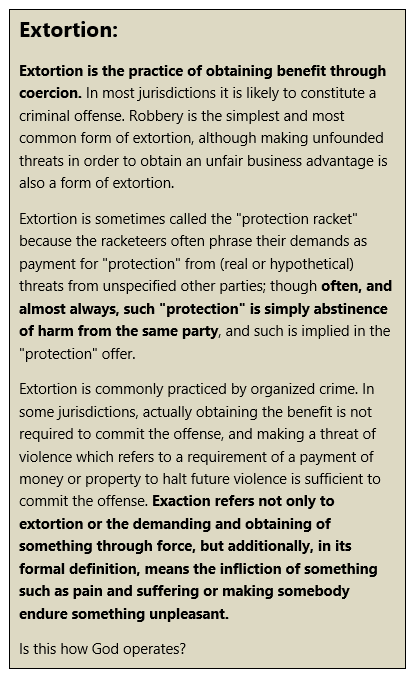
When Satan desired to become like the Most High, he desired to merge his identity with that of the Father so that his attributes (of being arbitrary, severe, and unforgiving) might clothe the Father and that he himself could hide in the Father’s brightness. From the beginning it has been Satan's studied plan to cause men to forget God, he has sought to misrepresent the character of God and lead men to cherish a false conception of Him. His master plan is to obliterate the divine image in man (Genesis 1:26, 27), to impress his own likeness upon the soul, and to imbue men with his own spirit and make them captives according to his will.
“You give your mouth to evil, And your tongue frames deceit. You sit and speak against your brother; You slander your own mother’s son. These things you have done, and I [God] kept silent; You thought that I was altogether like you; But I will rebuke you, And set them in order before your eyes.” (Psalm 50:19-21)
1As an interesting side note, there is some confusion among scholars as to the first line of Luke 9:51 which says: “Now it came to pass, when the time had come for Him to be received up.” Many assume this is referring to being received up into heaven after His resurrection. The NIV translates it this way: “As the time approached for him to be taken up to heaven, Jesus resolutely set out for Jerusalem.” The NLT says: “As the time drew near for him to ascend to heaven, Jesus resolutely set out for Jerusalem.” However, the word “heaven” is not even in the Greek. It is actually referring to the concept of aliyah which is a Jewish expression relating to “going up” to Jerusalem, especially during the three pilgrim Feasts (in this case, the Feast of Passover). The custom of “making Aliyah” is missed when reading from the Greek and English. “Aliyah in Hebrew means ‘ascent’ or ‘going up’. Jewish tradition views traveling to the Land of Israel as an ascent, both geographically and metaphysically. In one opinion, the geographical sense preceded the metaphorical one, as most Jews going on pilgrimage to Jerusalem, which is situated at approximately 750 meters (2,500 feet) above sea level, had to climb to a higher elevation” (Wikipedia). We see this right in the context as Jesus “set His face to go to Jerusalem” (Luke 9:51) and that the Samaritans rejected Him “because His face was set for the journey to Jerusalem” (Verse 53).
This article has been translated to Nepali: (गन्ती १६:२८-३४) के परमेश्वरले कोरह, दातान र अबीरामलाई मार्नुभयो?





